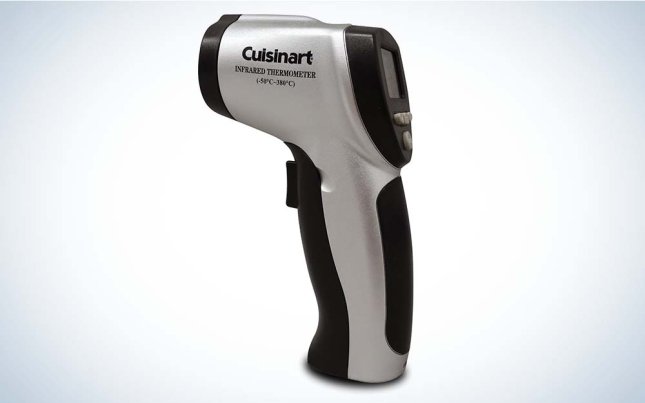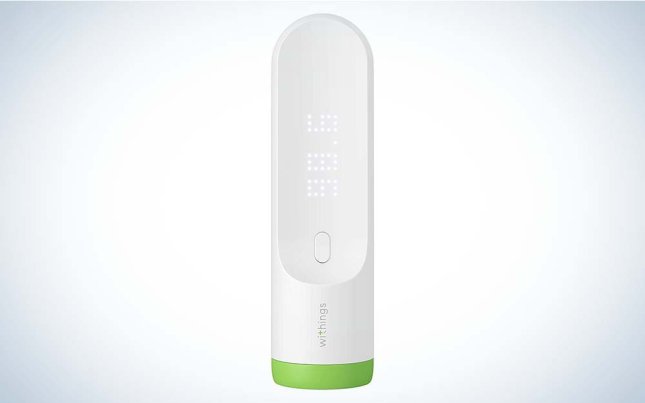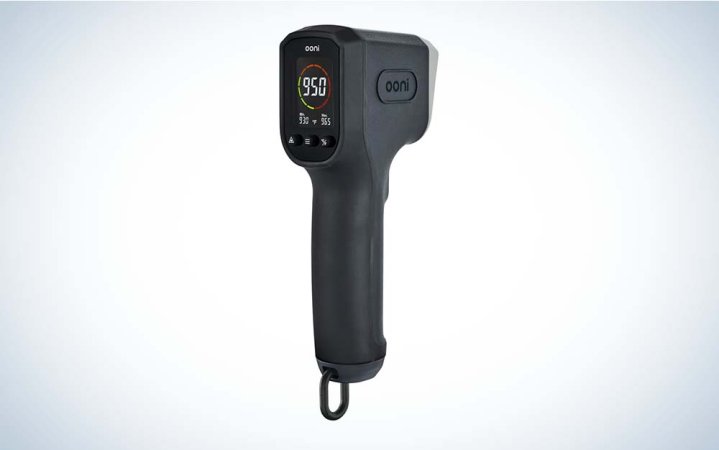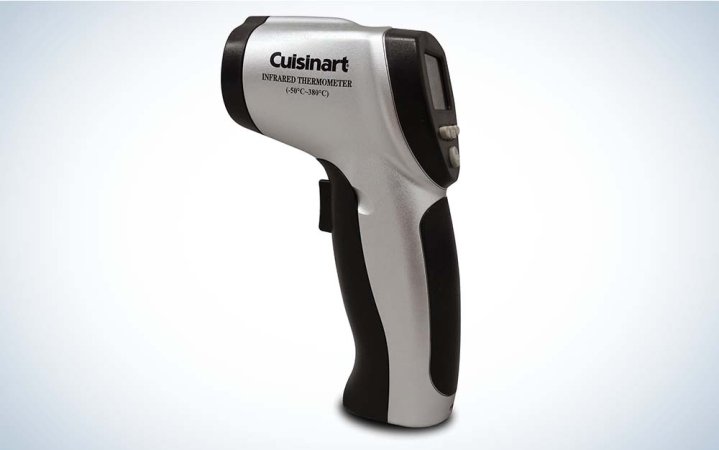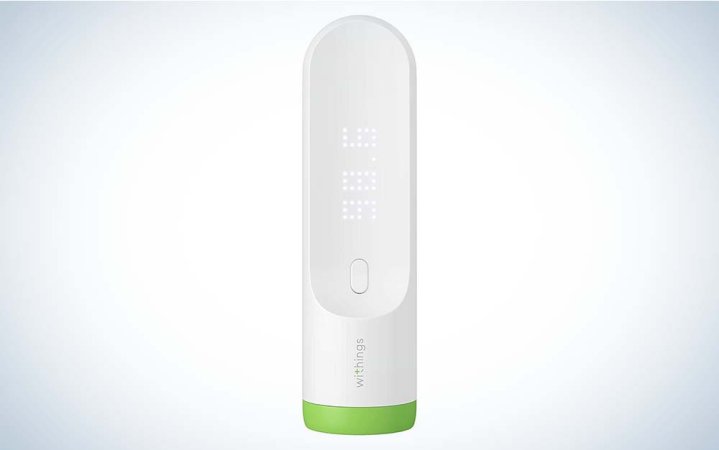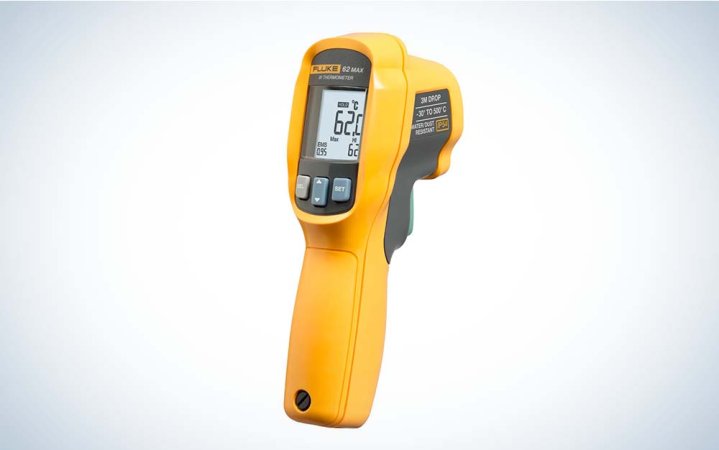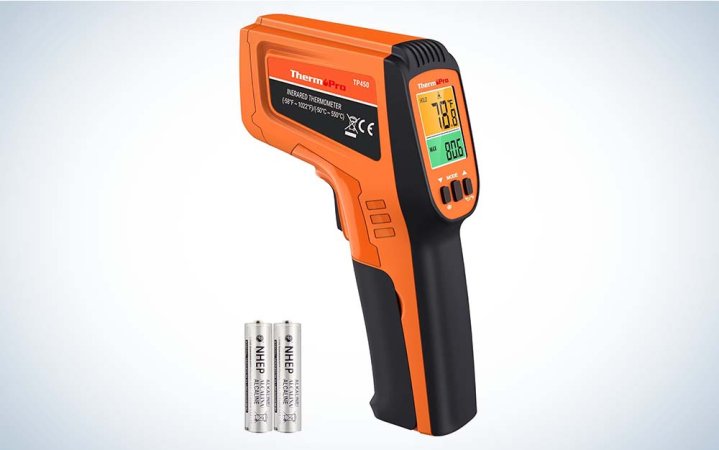We may earn revenue from the products available on this page and participate in affiliate programs. Learn more ›
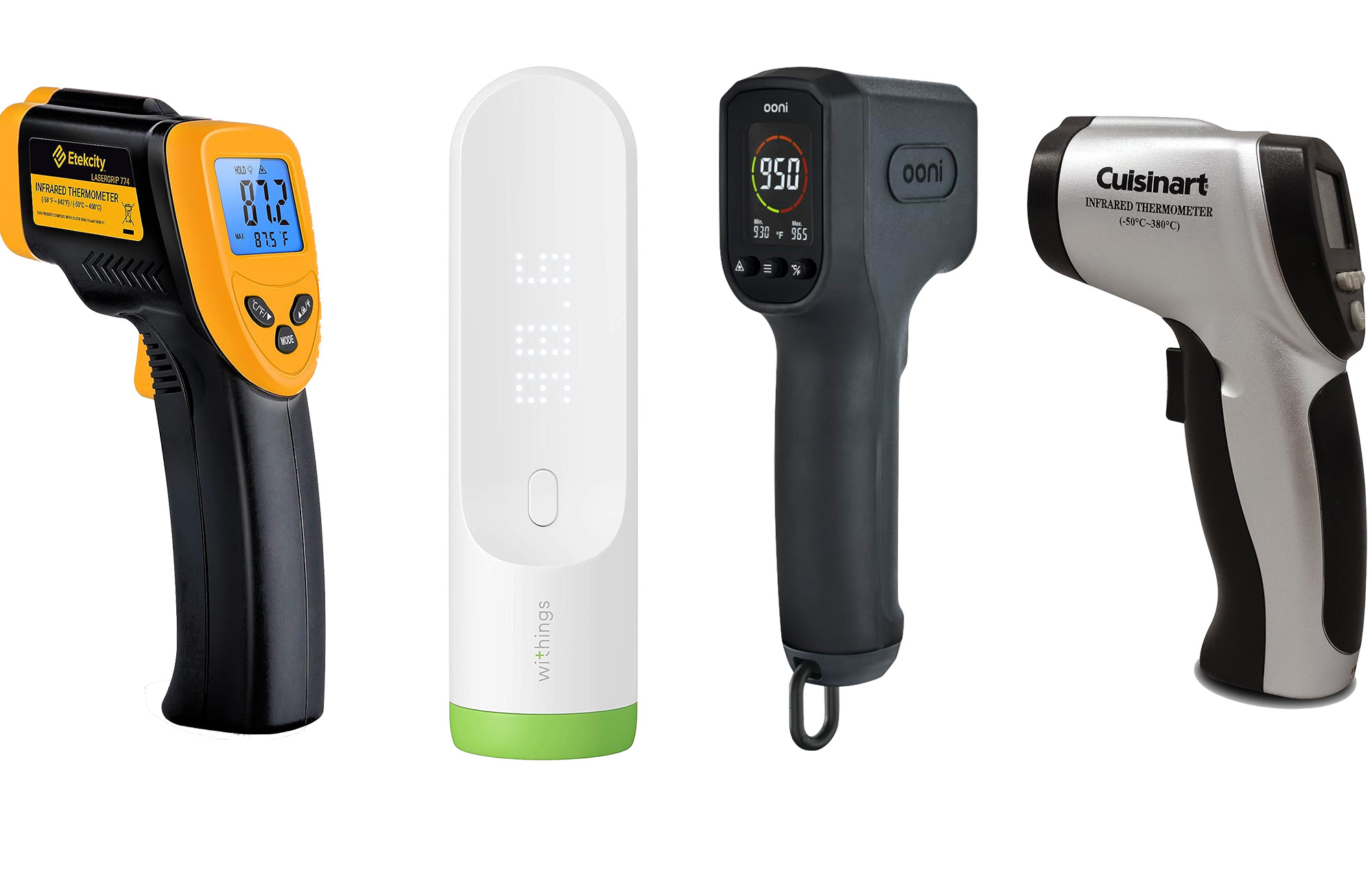
An infrared thermometer can be used in a variety of situations. From checking the temperature of your skillet before searing a juicy steak to finding out your child’s temperature to gauging the effectiveness of your home’s insulation—these little devices come in quite handy. However, there are numerous types of infrared thermometers to choose from.
“I find infrared thermometers extremely useful in the kitchen and use mine almost as much as I use more traditional thermocouple or probe thermometers,” says Michael Laiskonis, a chef at the Institute of Culinary Education. “They are indispensable for speed, accuracy, and hygienic reasons—but not always useful for all applications.” While it’s true you’d really need a meat thermometer to read the internal temperature of food, the best infrared thermometers can still be used in a variety of other scenarios.
- Best overall: Etekcity 774 Infrared Thermometer Gun
- Best for pizza ovens: Ooni Infrared Thermometer Gun
- Best for grilling: Cuisinart CSG-625 Infrared Surface Thermometer
- Best for humans: Withings Thermo Smart Temporal Thermometer
- Best industrial: Fluke 62 Max Infrared Thermometer
- Best temperature range: ThermoPro TP450 Dual Laser Temperature Gun
How we chose the best infrared thermometers
As a freelance journalist for over 10 years, I’ve reviewed home and tech products for publications including Forbes, CNN Underscored, NBC News Select, Popular Mechanics, Architectural Digest, Tom’s Guide, The Daily Beast, USA Today’s Reviewed, TechRadar, Better Homes & Gardens, Bob Vila, and, of course, PopSci. My recommendations for the thermometers are based on a mix of hands-on testing, research, and advice from two experts. I also weighed quality of build, accuracy, emissivity, price, and other features.
The best infrared thermometers: Reviews & Recommendations
There are various types of infrared thermometers. Whether you need one for your kitchen, outdoor grill, pizza oven; to take your family’s temperature; or to test components in your HVAC, automobile, or another industrial application, we’ve got you covered. One of these infrared thermometers is designed for your intended scenario.
Best overall: Etekcity 774 Infrared Thermometer Gun
Best overall
Etekcity 774 Infrared Thermometer Gun
Pros
- Wide temperature range
- Emissivity Mode
- Max/min/average temperature modes
Cons
- Cheesy plastic body
Why it made the cut: It’s not often that the best budget option offers so much versatility and has so many features.
Specs
- Temperature range: –58 to 842 degrees F
- Adjustable emissivity: Yes
- Distance to spot-size ratio: 12:1
- Response time: 0.5 seconds
- Accuracy: Not available
The Etekcity 774 Infrared Thermometer Gun is our pick for the best overall infrared thermometer gun—and it’s also the best budget choice. The price is almost unbelievable, considering how much value the infrared thermometer gun provides. With a temperature range from -58 degrees to 842 degrees, along with non-contact measuring, you can stay a safe distance from hot areas. This makes it ideal to use in the kitchen or when grilling outdoors.
Other use scenarios include checking the surface temperature of your vehicle’s engine, checking your HVAC’s surface to ensure it’s working properly, and measuring fluid temperatures. In addition, the adjustable emissivity mode allows the device to measure the temperature on various surfaces, including steel, water oil, ice, iron, and plastic. The infrared thermometer has a high accuracy rate and a max temperature measurement to gauge the temp in a larger area.
The results can be viewed in 0.5 seconds or less on the LCD display. And the infrared thermometer gun comes in four colors: black/yellow, blue, orange, and yellow.
Best for pizza ovens: Ooni Infrared Thermometer Gun
Best for pizza ovens
Oonit Infrared Thermometer Gun
Pros
- Great for pizzas
- Wide temperature range
- Adjustable emissivity easily reads pizza stones
Cons
- Best used for pizza ovens
Why it made the cut: The Ooni Infrared Thermometer Gun has been calibrated specifically for cordierite baking stone but can also be used on other surfaces.
Specs
- Temperature range: -22 to 999 degrees F
- Adjustable emissivity: Yes
- Distance to spot-size ratio: 10:1
- Response time: Less than 300 milliseconds
- Accuracy: 2% or 4 degrees F
Ooni is known for great pizza ovens, so it’s no surprise that the company also makes a great infrared thermometer. For starters, the Ooni infrared thermometer gun has a ridiculously wide temperature reading range of -22 degrees to 999 degrees F—and it’s accurate to 2% or 4 degrees F. This level of accuracy, combined with the ability to provide maximum, minimum, and average temperatures, lets you know the precise time to launch your pizza into the oven.
The non-contact Ooni infrared thermometer is specifically designed for cordierite pizza stones; however, since it uses an advanced emissivity setting, the infrared thermometer can also be adjusted to more accurately read temperatures on steel, cast iron, and other types of materials and finishes. The backlit LCD screen can easily be read, whether in direct sunlight or low light settings. There’s also a helpful color temperature ring on the screen, which indicates the recommended baking temperature range.
Best for grilling: Cuisinart CSG-625 Infrared Surface Thermometer
Best for grilling
Cuisinart CSG-625 Infrared Surface Thermometer
Pros
- Great for grills and pizza stones
- Max/min temperature
- Records temps up to 716 degrees
Cons
- No adjustable emissivity
Why it made the cut: Meat is too expensive to burn on a grill, and this infrared surface thermometer ensures you don’t overcook (or undercook) it.
Specs
- Temperature range: –58 to 716 degrees F
- Adjustable emissivity: No
- Distance to spot-size ratio: 12:1
- Response time: Not available
- Accuracy: ±2%
With the Cuisinart CSG-623 Infrared Surface Thermometer, you can locate hot spots and cold spots (so you can put meat where it cooks best and also position items—like veggies—that don’t need as much heat). Since you can’t see these hot and cold spots with the naked eye, the infrared thermometer allows you to make adjustments accordingly. With a readable temperature range of -58 degrees to 716 degrees F, it accurately records surface temperatures.
The LCD screen is easy to read, and the backlit function can be turned on or off as desired. The Cuisinart CSG-623 infrared thermometer can also be used with pizza ovens and other household appliances, like the oven and refrigerator, and even to determine how much heat is being generated by your computers and other electrical devices.
Best for humans: Withings Thermo Smart Temporal Thermometer
Best for humans
Withings Thermo Smart Temporal Thermometer
Pros
- Medical-grade results
- Supports up to 8 users
- Connects via WiFi
- Contactless
Cons
- Expensive
Why it made the cut: The contactless body thermometer can be used with babies, infants, kids, and adults—and readings can be saved to your smartphone.
Specs
- Temperature range: 95 to 109.8 degrees F
- Adjustable emissivity: N/A
- Distance to spot-size ratio: N/A (0.5” from forehead)
- Response time: N/A
- Accuracy: 0.4 degrees F
The Withings Thermo Smart Temporal Thermometer is a safe, easy, and hygienic way to take the temperatures of every member of your family. You can get a contactless scan from babies, infants, kids, teens, and adults by holding the infrared thermometer 0.5 inches from the forehead. This non-invasive process eliminates the need to stick devices in ears, mouths, and other body cavities, and the 16 infrared sensors provide quick and accurate results. In addition, the LED indicator is color-coded based on whether the reading indicates the temperature is normal, elevated, or high.
The infrared thermometer can also be synced via WiFi with your smartphone or tablet. After syncing, you can view historical data (for example, the temperature two hours ago, five hours ago, yesterday, etc., for up to 8 users). There’s also room for notes in the app, so you can also list the symptoms in the app, as well as which meds were administered on which date and at what time. This provides a helpful record that can be shared with doctors and other caregivers.
Best industrial: Fluke 62 Max Infrared Thermometer
best industrial
Fluke 62 Max Infrared Thermometer
Pros
- Wide temperature range
- Adjustable emissivity
- Max/min/avg temp
Cons
- Expensive
Why it made the cut: This thermometer allows users to take accurate readings in potentially hazardous industrial settings.
Specs
- Temperature range: -22 to 932 degrees F
- Adjustable emissivity: Yes
- Distance to spot-size ratio: 12:1
- Response time: less than 500 milliseconds
- Accuracy: 1.5%
For industrial use, the fact that the Fluke 62 Max Infrared Thermometer is a non-contact device is particularly important. When working in hazardous locations or performing predictive maintenance, you want to be far enough away that you’re in no danger when trying to gauge the temperature. In other scenarios, it could just be inconvenient to get so close, such as when you’re diagnosing HVAC duct leaks, insulation, or blower motors; as well as mechanical readings for gears, shaft alignment, bearings, and hydraulics; or electrical panels, wiring and cables, etc.
Adjustable emissivity allows the infrared thermometer to provide accuracy when reading a range of materials. The large display is backlit for easy viewing in dark environments, and the durable device has an IP54 dust and water resistance rating—and has also been tested safe at a 9-foot drop.
Best temperature range: ThermoPro TP450 Dual Laser Temperature Gun
Best temperature range
ThermoPro TP450 Dual Laser Temperature Gun
Pros
- Dual lasers
- Adjustable emissivity
- Max/min/avg readings
- Reads temps up to 1022 degrees F
Cons
- Some users found the reading to be off
Why it made the cut: Dual lasers make this infrared thermometer more accurate.
Specs
- Temperature range: –58 to 1022 degrees F
- Adjustable emissivity: Yes
- Distance to spot-size ratio: 16:1
- Response time: 0.5 seconds
- Accuracy: ±1.5%
The ThermoPro TP450 Dual Laser Temperature Gun has, as its name states, dual lasers, and this helps it deliver the most accurate results. In fact, it’s accurate up to ±1.5%. The infrared thermometer also has a temperature range of -58 degrees to 1022 degrees—and the latter is the highest temperature on our list. The 16:1 distance-to-spot-size ratio is also the furthest distance on our list, allowing you to stand a considerable distance away and still obtain an accurate reading. Also, the 0.5-second response time is among the fastest on our list.
With a max/min/avg temperature, it’s easy to get a complete picture of the temperature in a given area. The device uses an LCD display with large numbers and a colorful background. The infrared thermometer is versatile enough to gauge the temperature in a grill, pizza oven, HVAC, swimming pool, vehicle, and many other scenarios.
What to consider when buying an infrared thermometer
Use
The most important thing to keep in mind when buying an infrared thermometer is how you’re going to use it. “Remember that it only measures the surface temperature of an object, and only at a specific point,” says Michael Laiskonis of ICE.
He uses his daily to get a quick, no-contact read on items like melted chocolate. “However, it can be less accurate with more dynamic preparations, like a boiling sugar syrup or hot frying oil, where temperatures can fluctuate from one spot to another.”
For measuring internal temperatures—such as cooked meats—Laiskonis says you should use a probe thermometer.
Accuracy
The whole point of using an infrared thermometer is to accurately gauge the temperature in a given scenario. “I always look for accuracy: baking and candy-making require precision, so a device that promises accuracy to within ±1.5°F or better is a worthy companion,” advises Emily Laurae, a pastry chef and recipe developer.
Sometimes accuracy is listed in percentages, and 1.55 to 2 percent is a good range.
Adjustable emissivity
“Opt for a thermometer with a good emissivity range—that’s a fancy term for the tool’s ability to read various surface temperatures,” explains Laurae. “From the glistening surface of caramelizing sugar to the skin of a proofing dough, differing surfaces shouldn’t stump your device.”
Infrared thermometers with adjustable emissivity result in more precise measurements in different scenarios. For example, with some materials, like stainless steel, it’s more difficult to detect temperatures. However, adjusting the emissivity can provide a more accurate gauge.
Some companies, like Etekcity, provide an Emissivity Reference Chart with guidelines for making emissivity adjustments on materials like steel, water, oil, ice, iron, paper, plastic, sand, snow, heated food, frozen food, sand, carbon, and clay.
Non-contact feature
A non-contact infrared thermometer lets you measure the temperature from a safe distance. This allows you to stay far enough away from the source that you won’t burn your fingers on a hot grill or have air blown in your face when working with your HVAC. With a medical infrared thermometer, a no-touch option can reduce the risk of spreading disease between tested individuals.
Display
“A user-friendly design with a clear display is more than just aesthetics; it’s about ensuring you can catch a quick, accurate read in the midst of your tasks,” says Laurae. Some devices also have a colorful background that provides contrast and makes the numbers easy to read. Some models have an option to turn the background on or off. “Also, a hold function can be a lifesaver, locking in the last recorded temperature so you have a reference point as you go,” recommends Laurae.
FAQs
No, a meat thermometer is used to read the temperature inside of the meat, whereas an infrared thermometer reads the meat’s surface temperature. When cooking food, the internal temperature needs to be high enough to kill germs, and the only way to determine this is by using a meat thermometer, which is inserted into the food item.
“Infrared thermometers are perfect for gauging griddle readiness or the surface temp of your chocolate tempering, but they won’t tell you if your roast is done in the middle,” says Laurae.
Sometimes, it’s difficult to get a good reading with a meat thermometer, so you might have to move it from one spot to the next. An infrared thermometer can help you determine surface temperature so you’ll know where to put the meat thermometer.
It can be used to ensure that your pots, pans, and skillets have reached the correct temperature before you put food in them (for example, when you’re searing a steak). This can help you avoid overcooking or undercooking the meat. An infrared thermometer can also provide the temperature in a freezer.
“See this tool as a complement to your kitchen, not a replacement for your trusty probe thermometer,” says Laurae. “It’s like having an extra set of eyes that help ensure everything in your kitchen is exactly the right temperature.”
While specific tips and directions may vary by manufacturer, there are some general tips to help you get the most accurate measurement. For example, don’t try to measure the temperature through glass, smoke, or steam. When measuring glass temperatures, Etekcity recommends placing a strip of opaque material (like duct tape) on the glass and then measuring the temperature on the duct tape. Also, if the infrared thermometer is not designed to be used on people and animals, don’t attempt to do so. Only use medical thermometers for this purpose.
Yes, infrared thermometer guns are safe. However, when you’re using one, refrain from looking directly into the laser beam and never point it toward anyone else’s eyes, either.
Final thoughts on the best infrared thermometers
- Best overall: Etekcity 774 Infrared Thermometer Gun
- Best for pizza ovens: Ooni Infrared Thermometer Gun
- Best for grilling: Cuisinart CSG-625 Infrared Surface Thermometer
- Best for humans: Withings Thermo Smart Temporal Thermometer
- Best industrial: Fluke 62 Max Infrared Thermometer
- Best temperature range: ThermoPro TP450 Dual Laser Temperature Gun
The best infrared thermometers can be used in various scenarios, ranging from the kitchen to your outdoor grill, as well as to take the body’s temperature or gauge temperatures in industrial settings. The best option for you depends on usage scenarios and budget. However, we’ve provided a variety of options to help you zoom in on the infrared thermometer for your needs.

